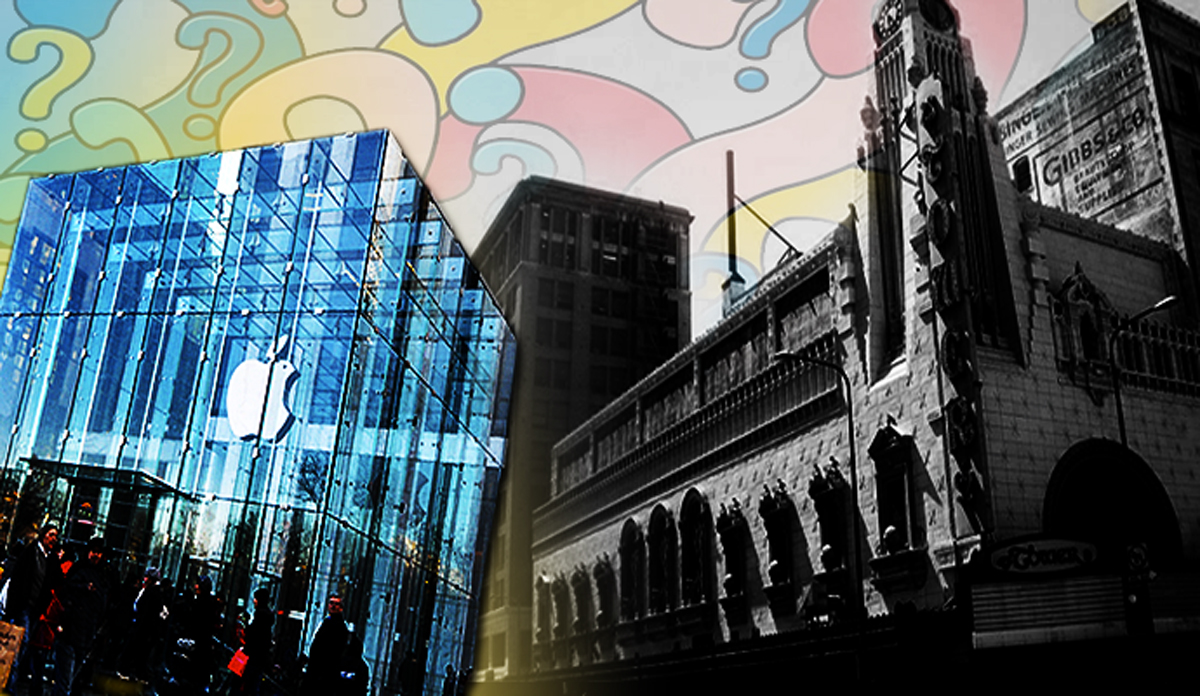The latest iPhone release always attracts attention, drawing a crowd of people who wait hours outside each Apple store for their prized possession. But in Los Angeles, it’s what Apple hasn’t done that has left the real estate industry waiting.
Since 2015, Apple has been rumored to be opening a retail store in Downtown L.A., at the 7,500-square-foot Tower Theatre at 802 South Broadway.
But with no official announcement from the technology giant, local landlords and tenants have been reluctant to sign long-term leases in that neighborhood, brokers say. New tenants don’t want to invest in a location where the biggest attraction isn’t locked in — especially in an area that has struggled to draw top retailers — and landlords may see an opportunity to boost rents once Apple’s presence is confirmed.
The Cupertino-based company has long had the ability to upend a neighborhood’s retail market after setting up shop, experts say. Apple has raised sales by 10 percent in malls in which it operates a store, according to a report from real estate research firm Green Street Advisors. Its presence has also led landlords to charge neighboring tenants more, with the theory that the company sharply increases foot traffic to the area.
Apple stores have also meant big money for property owners. In Chicago, Walton Street Capital is hoping to sell a 20,000-square-foot Apple store inside its office building on Magnificent Mile for as much as $175 million. Considering it paid $370 million for the property a little less than a year ago, that would mean the Apple store could account for nearly half the building’s value, even though it occupies less than 3 percent of the square footage.
In L.A., local commercial broker and blogger Brigham Yen first wrote about the South Broadway Apple store rumor in November 2015. Brigham said there were “enough people” that he trusted who confirmed Apple’s decision to open a store. An article by the Los Angeles Business Journal in May 2016 also mentioned the possibility.
Another post by Yen last September with the headline, “OMG: Apple store done deal,” renewed interest. Still, Apple has remained silent, and the company did not respond to requests for comment for this article.
The theater is owned by the Delijani family, which owns several other Downtown properties including the Palace, State and Los Angeles theaters. Representatives for the family could not be reached for comment.
Apple’s presence would likely boost traffic along the Broadway corridor. Ground-floor retail vacancy rates there hover at around 15 to 20 percent, nearly four times the average of Greater L.A., according to a recent report from CBRE.
“I wouldn’t be surprised if something was announced in the next six months,” said Gabe Kadosh, a Colliers International retail broker in Downtown, of the Broadway Apple store.
There are seven Apple stores in L.A.
The sheer possibility that the company will open a retail location has slowed activity in the real estate market in that area, as tenants and landlords wait to see what happens, several local brokers said. Landlords are reluctant to offer long-term leases to tenants because the going rate would likely be much higher if Apple inks its deal for South Broadway, Kadosh said.
“The reason why it could be worth waiting is because the value would go up,” said Jay Luchs, a broker at Newmark Knight Frank. “But no one likes waiting for the unknown. It’s like waiting for a check to come in and you don’t know when it’s going to come.”
It’s also caused some hesitation among tenants, who are waiting to see where Apple will go in an effort to hopefully gain some of its foot traffic that might spillover.
“The hardest thing to do in retail is to get people to show up,” Luchs said. “If you have an Apple store, it’s like having a restaurant. You have people everywhere.”
